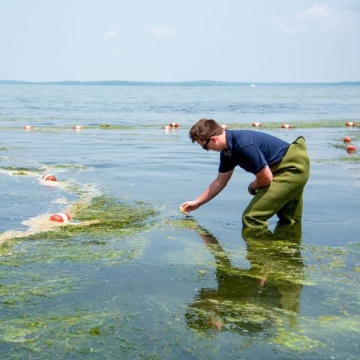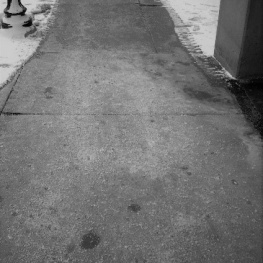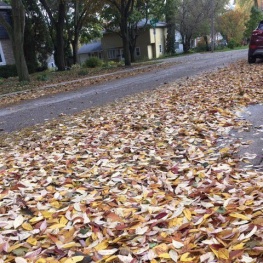Protecting Lake Water Quality

What Impacts the Quality of Our Lake Water
Rain and melting snow that run over driveways, parking lots, streets, lawns, and farmland pick up and carry sediments and other contaminants. The pollutants in this water can end up in our lakes through the stormwater system.
Examples of pollutants that can end up in our lakes:
- Sediment and nutrients washed from farmland and construction areas
- Oil, grease, pesticides, herbicides, cleaners, and toxic chemicals from motor vehicles
- Nutrients from lawn and garden fertilizers
- Phosphorus in leaves
- Viruses, parasites, and bacteria from birds and pet waste
- Road salt used on roads and sidewalks in winter
Effects of these pollutants:
- Toxic algae blooms
- Waters become murky, making it hard for plants to grow and destroying aquatic habitats
- Animals and humans can become sick
- Drinking water can become contaminated
Get information about levels of pollutants in Dane County lakes, streams, and rivers on the Healthy Dane Water Quality Dashboard.
You Can Help Protect our Lakes and the Environment

- Reduce the amount of salt you put on sidewalks and driveways in winter, or use sand instead. A 12 ounce coffee mug of salt is enough for a 20 foot driveway or 10 sidewalk squares.
- Keep leaves, grass clippings, pet waste, debris, and trash, off sidewalks and streets. Make sure they don’t go into gutters, storm sewers, and lakes.
- When it rains, phosphorus from leaves in gutters runs into storm drains, then into our lakes, causing toxic algae blooms. Rake leaves out of gutters and add them to the leaves you raked from your yard. Sign up to get text alerts to remind you to rake leaves out of gutters before predicted rainfalls.
- Wastewater from things like mopping and laundry must go into an indoor drain. That wastewater is treated before being released into the environment. It is against the law to dump it on the street, in the gutter, or into a storm sewer.

- Limit your use of pesticides, herbicides, and fertilizers on your lawn and garden. If you use them, follow directions carefully. Remove any fertilizer that gets on your driveway and sidewalk.
- Wash your car where the wastewater will soak into the ground and not run off into the gutter and storm sewer.
- Make sure your roof drains to a grass or gravel area. Don’t let them drain to the street, driveway, or paved area that drains to storm sewers.
- Call us at (608) 266-4821 or fill out an online report (below) if you see:
- Something going into a storm sewer or lake with an unusual color or odor
- Unusual floating objects in the water
How We Protect Our Lakes and Streams
- We look for pollution by monitoring and sampling water from lakes, rivers, and streams.
- We respond to reports about things being discharged into storm sewers and lakes.
- We test for signs of environmental concerns, like bacteria and nutrients.
- We regulate over 165 permitted sites for discharges of non-storm water to lakes Mendota, Monona, and Waubesa.


